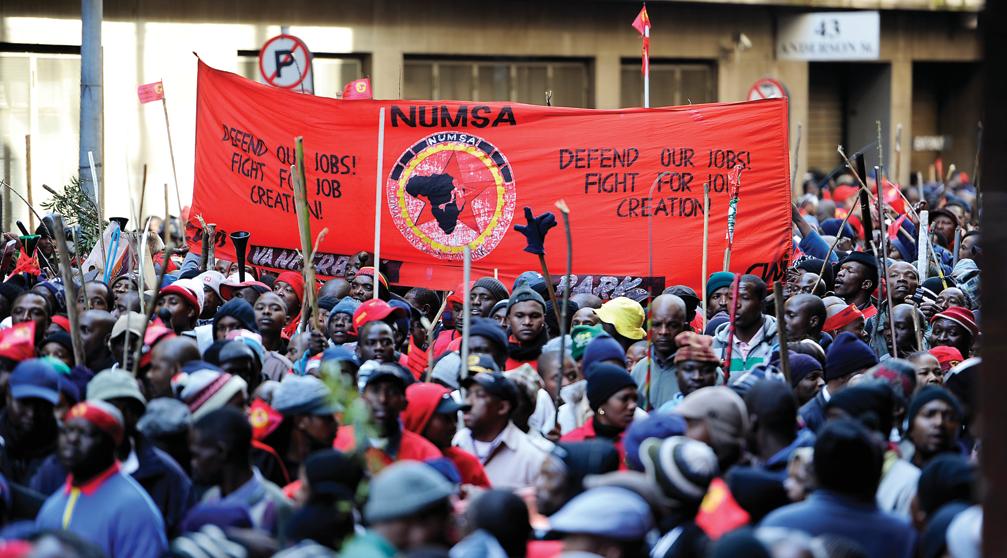The national strike committee (NSC) of the National Union of Metalworkers of SA (Numsa) has resolved to intensify its metals and engineering strike, the union said on Wednesday.
“The NSC, as duly mandated by the national executive committee, has developed a maximum programme of action to intensify and accelerate the strike action,” said spokesman Castro Ngobese.
The union would immediately begin mobilising members to take part in protest marches and call meetings in industrial areas.
Numsa would also hold solidarity lunchtime pickets in industries linked to the metals and engineering sector, including the mining, auto, tyre and rubber industries, as well as at Eskom and Transnet.
Ngobese said workers employed through labour brokers would be encouraged to join the strike.
“The NSC was emboldened by the massive and growing strength and success of the strike in all corners of the country: in major industrial areas, affluent cities and rural towns, where the toiling black and African working class sells its labour power for a pittance.”
Earlier on Wednesday, Numsa deputy general secretary Karl Cloete said the union was considering a secondary strike at all companies linked with the metals and engineering sector.
Following concerns of strike-related violence, Ngobese said the union had adopted extra measures to ensure pickets and other demonstrations were peaceful.
“The union has made a public call to all our striking members to be vigilant and guard against agent provocateurs or rotten non-Numsa elements that want to hijack the strike.”
Numsa members in the metal and engineering industries downed tools on July 1, initially demanding a salary increase of 12 percent, dropped from their pre-strike demand of 15 percent. They also demanded a R1000 housing allowance, and a total ban on labour brokers.
The union announced on Sunday it had lowered its wage demand to 10 percent.
Ngobese said: “Our members are united and they have resolved that nothing will divide them or weaken their strike for a living wage and improved benefits”.
The NSC, during its meeting on Tuesday, was alerted to the Steel and Engineering Industries Federation of Southern Africa’s (Seifsa) withdrawal of its offer of a 10 percent wage increase in 2014, 9.5 percent in 2015, and nine percent in 2016.
Seifsa also said it did not have any further planned engagements with Numsa.
It has reverted to its previous offer of a 10 percent increase in 2014 and nine percent in 2015 and 2016.
For higher-earning artisans on level A, the offer remained eight percent in 2014, 7.5 percent in 2015, and seven percent in 2016.
Ngobese said the union found this “neither surprising nor shocking”.
“We reiterate that the offer has been unanimously rejected by workers, through a democratic and transparent process, in line with our established practices as a worker-controlled union.”
Employers’ organisations assertions that the strike could drive country into recession were also rejected.
“Such blatantly racist insinuations and misguided commentary, designed to protect the profits of the bosses and maintain the colonial wage structure, are devoid of truth.”
Seifsa could not immediately be reached for comment.
Earlier on Wednesday, Labour Minister Mildred Oliphant said she would meet Numsa and Seifsa for further talks to spare the economy another protracted strike, following the five-month strike in the platinum industry.
In the first week of the strike, she facilitated talks between the parties.
On Wednesday she told reporters in Pretoria that after the previous meeting: “Everybody was saying that there was a possibility of the ending of this strike.
“And therefore I have to meet with them so that they can explain what has happened or what went wrong, and look at possibilities of really coming to the table and finalising this issue — because as a country we can’t really afford a prolonged strike.”
Master Builders SA CEO Tumi Dlamini said in a statement earlier that the strike had disrupted the supply of building materials to contractors, and slowed down work on building sites.
Agence France-Presse reported that a parts shortage due to the strike had led car manufacturer Toyota to suspend most of its South African production. SAPA






 WhatsApp us
WhatsApp us 

